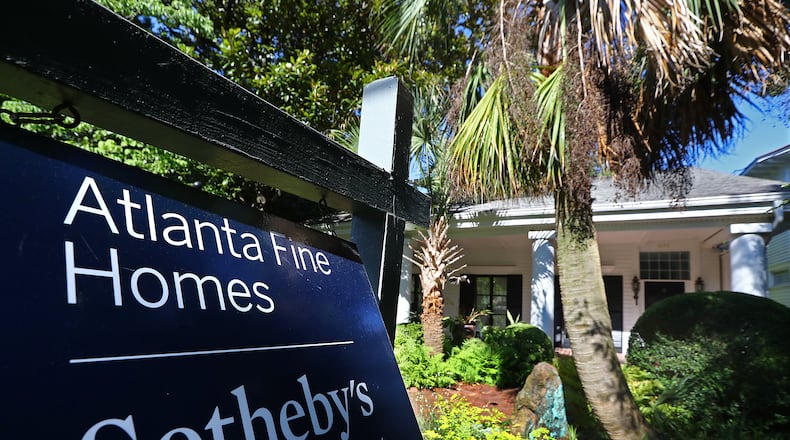Sellers still have the upper hand in the metro Atlanta housing market, thanks to the mismatch between scarce supply and a surplus of wannabe buyers. But with mortgage rates rising, there are signs that a tentative and slow rebalancing has begun.
Many potential buyers are still bidding against each other — especially for the more affordable homes — so sellers last month on average were getting their asking price as the median price of a home sold edged up to $402,000 in the 28-county region that includes Atlanta, according to Re/Max.
That price was a resounding 18.2% higher than in June of last year, said broker Kristen Jones, owner of Re/Max Around Atlanta.
“Demand still far outweighs supply in metro Atlanta,” she said.
Still, signs are emerging that the Federal Reserve’s inflation-fighting steps are having an effect on metro Atlanta’s housing market. Prices are still rising, but the pace of growth has slowed, and inventory has grown amid slower sales compared to a year ago.
To fight inflation, the Federal Reserve has been raising short-term interest rates, a campaign that has indirectly nudged mortgage rates higher as well. The average 30-year, fixed-rate mortgage was 2.77% last summer and 3.11% in late December, but it’s been greater than 5% since mid-April.
The average 30-year rate was 5.51% in mid-July, according to Freddie Mac.
That was still lower than rates through much of the post-World War II era. However, it meant that a borrower with a $450,000 loan was paying about $525 more per month than at the start of this year.
Many experts said those rate hikes would chill housing, a market where crowds of buyers have been bidding against each other for the relatively scanty number of listings. Yet even before the pandemic, the housing market had been tilting toward sellers.
In a balanced market, where sellers and buyers have roughly equal negotiating power, the number of homes listed for sale — inventory — typically represents more than six months of sales. In contrast, listings in June represented just 1.4 months of sales in metro Atlanta.
On the supply side, there has been a feedback loop of scarcity: Many owners who wanted to sell saw how few other homes are for sale, fretted about whether they’d find another place and then decided to stay put.
Meanwhile, the region has lacked for new construction, a shortfall that started with the burst of the housing bubble. The 2007-09 recession was followed by years of virtually no new building. As the market grew hotter, builders scrambled to catch up, but they have been hampered by a still-erratic supply chain, a shortage of labor and often-restrictive zoning.
The homebuilding that’s happening now is largely geared towards more profitable higher-end homes, not starter houses.
Construction has simply not kept pace with population growth, said John Hunt, principal at MarketNsight, an Atlanta-based firm that tracks and analyzes the housing market.
“We have a massive under-supply of everything,” he said.
And while higher rates could force some buyers to go after less expensive homes, they do not change the basic calculus of American housing, Hunt said: People with good jobs and decent incomes often want to own a home and a huge number are reaching the age where they partner up and start families.
Moreover, Atlanta has been among the most attractive metros for people on the move away from more costly areas, he said.
“Our current demand is not based on irrational exuberance,” Hunt said. “This demand is simply a result of real job creation, real population growth, real in-migration, and real household formation.”
The transition back to a balanced market could take years, but there are some modest signs that it is, at least starting to shift in that direction. In some parts of the country, home prices have dramatically slowed or even stopped rising altogether, according to economist Ken Johnson at Florida Atlantic University’s College of Business.
Those regions are providing “an early warning sign that prices are leveling off and likely on the way back down,” he said. “We will look back at this point as the starting gun for the down slope in our next housing cycle.”
A sign that the equation is changing in Atlanta is reflected in a slowing pace of price growth.
The supply of homes listed for sale in metro Atlanta has increased to a level 40% higher than a year ago, according to Re/Max. In the central 12 counties, listings are up 55%, according to Georgia Multiple Listing Service.
Local experts say the region is paralleling the national trend of more buyers backing out of sales and homes listed for sale are not snapped up quite as quickly.
The feedback loop has slowly started to work in reverse, as higher supply leads to yet more supply, said Emily Wheeler, chief operations officer at Village Premier Collection, which has more than 400 real estate agents across eight offices in the region.
“I have seen a lot more people selling a home and buying another house,” she said. “A few months ago, that was just not a thing.”
Metro Atlanta housing market, May to June
Median price: 0.5%
Number of sales: 0.3%
Number of listings: 34.8%
Metro Atlanta housing market, since June 2021
Median price: 18.2%
Number of sales: -17.4%
Number of listings: 40.1%
Sources: Re/Max, Georgia Multiple Listing Service
_____________________
About the Author
Keep Reading
The Latest
Featured



